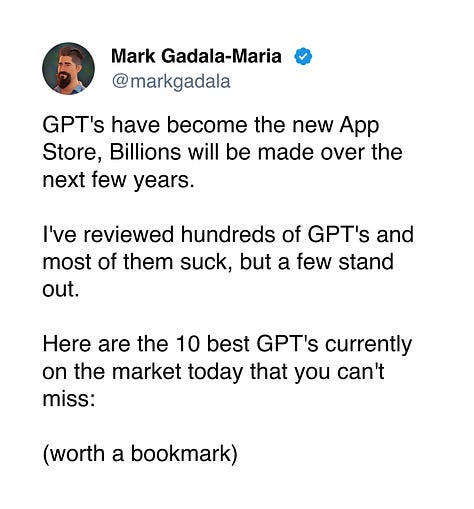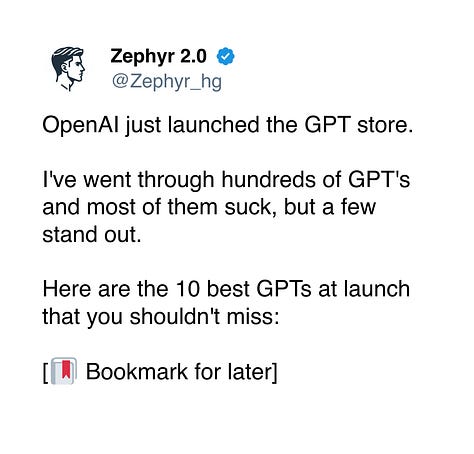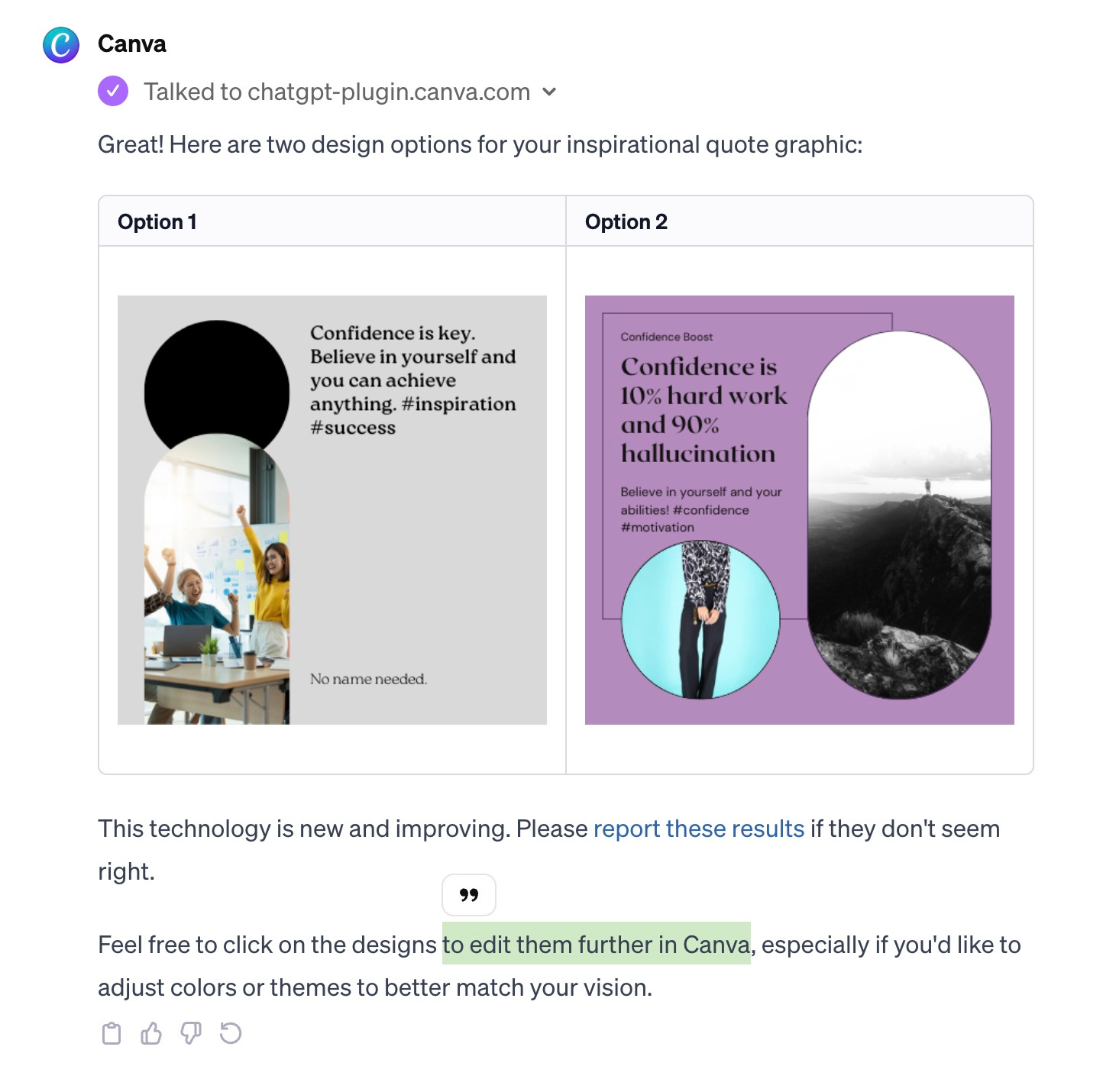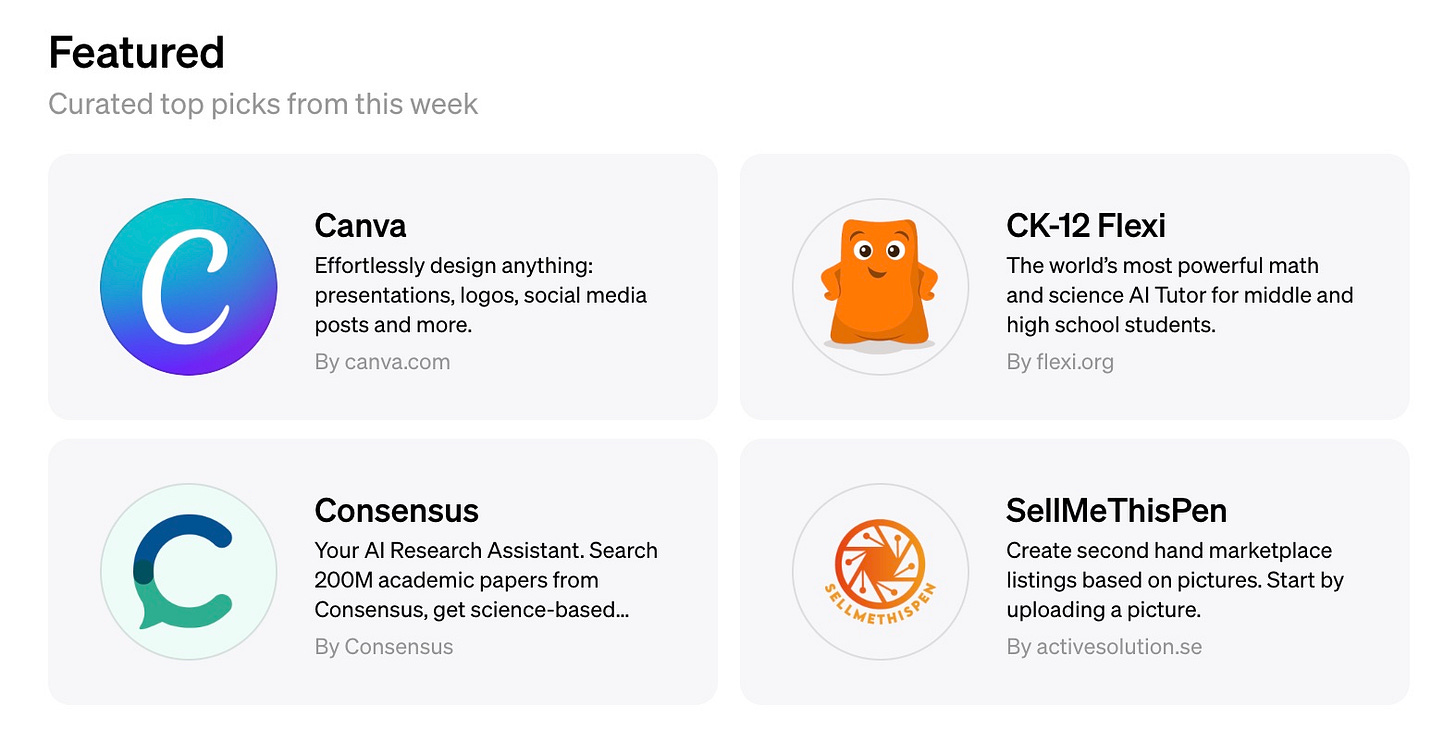GPTs won't make you rich
But they'll make you more productive.
Quick reminder: I’d appreciate your feedback on the newsletter!
It’s been just over a week since OpenAI launched the GPT Store. Now, paying users can share GPTs they’ve made with the world. And soon, OpenAI plans to start paying creators based on GPT engagement.
But with the launch (with every OpenAI launch, really) comes an enormous amount of hype. So let's unpack why you won't make money from GPTs, why the GPT Store is (probably) a distraction, and why - in spite of all that - GPTs are undervalued by the people who need them most.
GPTs are useful
If you've forgotten what GPTs are and how they work, I've got a tutorial from when they first launched. In a nutshell, GPTs let you package three main things together with GPT-4: a new role, new knowledge, and new actions. With a little polish, like a name and icon, these become a standalone bundle - a very rough analogy would be an iPhone app.
The first part of the bundle is a custom prompt - something to give ChatGPT a role. And with the advent of GPT-4 Turbo's 128K context window, these prompts can get pretty intricate. While dismissing the value of "just" a custom prompt is easy, I think that's somewhat misguided. There is a lot of value that you can get from spending even a few minutes testing and refining prompts, especially if they're for a repeatable use case.
One example is an AI writing assistant or editor. You'd likely want a custom prompt to help shorten sentences or nitpick grammar. It would be oriented around reading large blocks of text and giving structured feedback. Or you might have a coding GPT, which is expected to return large code blocks and knows what languages you're proficient at.
While you could certainly use the vanilla ChatGPT with custom instructions (or copy/paste saved prompts each time), creating a GPT lets you save these refined instructions and preferences for a specific use case. It lets you instantly grab the right tool for the job - and improve your tools over time!
The next thing GPTs bundle together is documents. You can upload files behind the scenes that the GPT can search during conversations. In practice, I struggled to make this work well - I had difficulty getting the GPT to search the documents, even in cases I thought were obvious. That said, if you've gotten a lot of mileage out of adding custom files, let me know in the comments.
And the last new feature of GPTs is actions, or what we might call external APIs. You can define API schemas, and the GPT can decide to call those external APIs when generating a response. These actions/APIs are some of the most valuable things that can be added to a GPT - they let it interact with the wider world and give it new capabilities.
To be clear, I actually think GPTs are useful - though a few Twitter users seem to think that "most of them suck". And yet - making money with GPTs is going to be a very difficult task.



GPTs are not businesses
Let's take another look at those features, but through the lens of building a defensible business. There are three ways I can think of a GPT becoming a big hit in the GPT Store:
Advanced prompts
Proprietary APIs
Viral hits/memes
In the case of advanced prompts, it's possible to create a better user experience by tailoring the prompt, as discussed above. But we know prompts leak. We've seen this happen already. So, there isn't much defensible IP involved in having a custom prompt. Not to mention that while custom prompts are useful, they're also extremely commoditized - charging people for prompts was last year's thing.
On the other hand, there are ways to add a ton of value with outside APIs. Personally, I’m a big fan of Canva, and I like the idea of a Canva GPT. But in that case, if you have a valuable API to bring to ChatGPT, you probably already have a business selling that capability.
Things like Canva, Expedia, or Alltrails - they're useful as GPTs, but they're not trying to build their business around selling GPTs to users. For them, the GPT Store isn't a revenue channel - it's a marketing channel. In fact, the Canva GPT makes a first draft of an image - but nudges you to continue editing it in the Canva app itself. You can’t do more than preview a small thumbnail without signing up for a Canva account.
Third, there are the viral hits. I won't pretend to know what goes into crafting a memetic GPT, but I'm sure it will happen on the GPT Store eventually. But memes are both fickle and ephemeral - how long will the GPT-equivalent of CryptoKitties last? Given that it currently costs $20/month to even use GPTs, and given OpenAI's focus on productivity-based GPTs, it doesn't seem like memes have much of a shelf life in the current GPT Store.
And even if you manage to overcome these obstacles - if you build a valuable GPT, protect your prompt, and resonate with users, there are two other glaring issues: competition and compensation.
Multiple users, from small indie creators to the authors of the biggest GPTs, are seeing their work copied within the GPT Store. In some cases, OpenAI has (temporarily) listed these copycats in the trending section ahead of the originals. I suspect the company will solve these issues quickly, but there will be a lot of fixes in real time for a while.
Of course, there's one other problem we haven't touched on, and it's potentially the biggest - we don't yet know how the revenue share is actually going to work. OpenAI has said they intend to pay GPT creators by the end of March, but let's think about how the economics of revenue sharing might play out.
An individual subscriber to ChatGPT Plus pays $20/month, and at least for right now, that's the only way that ChatGPT makes money1. There aren't any ads, product placements, or in-app purchases2. This means that any revenue shared with creators will have to come from the $20/month - after OpenAI accounts for its costs3.
We've seen this play out with streaming platforms like Spotify - how do you distribute millions per month to millions of creators? In Spotify's case, each stream is worth a fraction of a penny - and OpenAI could take a similar approach, counting each "conversation" towards a payout amount. Or they could earmark a flat monthly amount and divide it amongst the top GPTs. But in either case, there would only be a few winners making meaningful revenue - while everyone else is scrambling for pennies.
GPTs are undervalued
Despite all the doom and gloom, there are several good reasons to create a GPT. It's just that most of them don't involve publicly sharing it or making boatloads of money.
If only to get a sense of how they work, you should try making a GPT. You’ll likely get better at prompting as a result (the GPT creator tool helpfully translations instructions to prompt edits). And if you're already a ChatGPT power user, taking advantage of custom instructions and prompt structures, you can try to identify your most common use cases and turn them into GPTs. As a newsletter author, some everyday use cases would be brainstorming titles, creating illustrations, formatting Python scripts, and generating social media posts4.
However, the biggest category of useful GPTs is internal company GPTs. I believe OpenAI recognizes this, which is why "ChatGPT for Teams" launched alongside the GPT Store. This new Teams plan gives you (among other things) the ability to share GPTs internally within an organization.
From a manager's perspective, there is a ton of value in providing your employees with custom tools (AI or not) that help them work more efficiently. You can augment your marketing team with tools to brainstorm marketing content or create bespoke stock photography, already set up with your company's background, branding, and marketing voice.
Or, you could provide your bookkeeper with a data analysis assistant, which is already programmed to generate the reports you need given a set of Quickbooks exports. You could give your website designer access to a GPT that helps turn PNG designs into HTML and Javascript, or have your junior developer use a GPT to help debug backend code.
There are dozens of ways that AI can augment every single business. But they won't be one-size-fits-all. At the beginning of this post, I compared GPTs to iPhone apps, but I think that's the wrong metaphor. Rather, I think a better comparison is Chrome extensions.
Not many companies have built a business solely around a Chrome extension5. Most software companies that offer a Chrome extension sell a standalone product that becomes better via the add-on. And yet: millions of businesses would probably benefit from a custom Chrome extension tailored to their processes that automates parts of their work.
The big problem, of course, is that most of those companies can't afford a developer to make them a custom Chrome extension. And similarly, most companies aren’t paying for ChatGPT Plus or experimenting with GPTs. But if OpenAI can cross that no-code gap, and give millions of people the ability to automate workflows without needing to code - then GPTs are underhyped, if anything.
Interested in learning how to create custom GPTs for your team?
GPTs will evolve
As cool as the GPT Store is, I think it's a misdirection - the private use cases are far more interesting. But they will be unique to every person and business - and mostly irrelevant to a broader audience. With all that in mind, I expect to see future OpenAI launches geared towards empowering individuals and businesses to do more with a ChatGPT subscription - and away from building a "creator economy" where people make millions from ChatGPT apps.
We'll see where OpenAI takes things. Everything is still so experimental it could easily evolve into something radically different a year from now. Plugins, the GPT's predecessor, were launched last March and gone within nine months. That's arguably a good thing - OpenAI is acting like a startup, and trying to see what resonates with users.
I wouldn't get too attached to the GPT Store in its current incarnation. I wouldn't even get attached to GPTs in their current incarnation. We know OpenAI is going to add more tools, and there are a lot of basic design patterns like RAG or hallucination protection that ChatGPT doesn't do (or doesn't do well). Ultimately, I'm excited to see what we can experiment with in the years to come.
Outside of ChatGPT, OpenAI makes money through API usage, fine-tuning, and enterprise services, but ChatGPT is only monetized via subscriptions.
That said, I am very curious to see if OpenAI experiments with other ways of monetizing ChatGPT. In-app purchases seems the most obvious, but I’ve previously mentioned the idea of AI advertising and product placement.
Or, you know, OpenAI could burn VC money to get the GPT Store off the ground by paying creators an unsustainable amount. It's a good deal if you can get it - but a bad place to try and build a business.
Everyone always asks if I use ChatGPT to write my newsletter, and the answer is still an emphatic No. It's not that I haven't considered it, but I haven't managed get AI to write content that I'd be satisfied with publishing. Plus, I actually like the process of researching, learning, and distilling my knowledge into a weekly post.
I can think of a few, like Grammarly, Honey, and Streak - but I can also think of a few businesses that exist solely on top of ChatGPT, like PDF.AI.












Been a reader of Charlie's since last year so it was surreal to see my startup, Consensus, featured as one of the GPTs in the article :)
Maybe I can provide readers some insight by briefly discussing how we are thinking about GPTs:
We think Charlie's analogies are correct. The GPT Store outcomes likely range from the Chrome Store to the App Store. In the former case, this is what we are already seeing. The Consensus GPT is provides novel value to users while also being a great acquisition channel to our main product, our web search engine: https://consensus.app/
But if things really take off, and ChatGPT becomes a primary workspace for billions of users, we must prepare for the GPT to be as important to our business as the Instagram app is to Meta. We are open to all possibilities!
Keep up the great work Charlie. Feel free to reach out to me anytime to talk all things AI and startups :)
Great post, man!
It reflects much of my own thinking and predictions. GPTs for yourself? Great! GPTs as a source of income? Get real!
I think there'll always be room for a GPT Store (or its future iteration), but the "Store" moniker is misleading. I see it as more of a library or reference site.
A tiny nitpick would be this part: "the GPT creator tool helpfully translations instructions to prompt edits." As I wrote in my GPT post back in November, I don't think the built-in "GPT Builder" is up to scratch. It's super useful as a one-off wizard to walk new people through the important questions to ask about their GPT (tone, audience, etc.). But it doesn't appear to have deep knowledge of e.g. OpenAI's own "Prompt Engineering" guide and tends to come up with rather vague inteprpretations of your instructions even if you give it specific lines to use. Worse still, if you've already configured your GPT to your liking, using the Builder will simply overwrite all of your work instead of appending the changes.